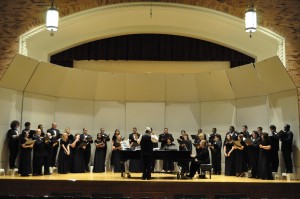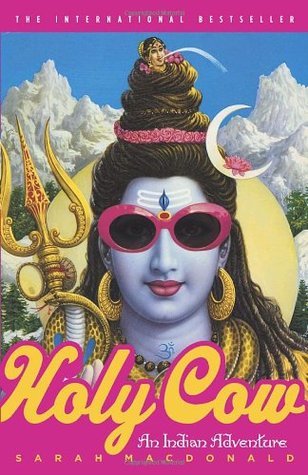
Photo by MEGHAN MYRACLE
The University Singers and Midwestern Singers performed a variety of sacred and secular songs in different languages Oct. 24.
Ayrian Boyd, a senior music education major, has been in University Singers for four years and in MIdwestern Singers for two.
“University Singers is the bigger, more traditional choir, while Midwestern Singers is a smaller a cappella group that allows for more jazzy numbers with different movements,” Boyd said.
Boyd sang a solo in the piece “Et Misericordia” due to the high nature of her voice.
Her favorite piece of the night, however, was “Choose Something Like a Star”, a piece inspired by the Robert Frost poem.
“I wasn’t too crazy about [the piece] at first,” Boyd said. “But there’s a high level of musicality to it.
The phrasing and composition is very dynamic, and the more time I spent with it, I realized how flawless and beautiful it was.”
The two choirs’ variety of pieces included performances of Joseph Flummerfelt’s “Danny Boy”, to Aguilar’s “Salmo 150”, Mac Huff’s “It Don’t Mean a Think if it Ain’t Got That Swing” and a rousing rendition of Moses Hogan’s “Ride on King Jesus.”
The men’s section also accompanied the University Singers on two pieces, Bortniansky’s “Cherubim Song” and Richard Wagner’s “The Pilgrim’s Chorus” from the opera Tannhäuser.
There were not any student compositions in this concert, but James Schuppener, choir director, said whenever a students does write a piece, they like to work it into their concerts.
“We have included [student compositions] in the past,” Schuppener said. “It takes time for the students to write them, and then we have to give them a hearing, but when everything is ready for one we try to program it.”
According to Schuppener, preparation for this concert required a substantial commitment for the 37 people involved.
“We’ve rehearsed four hours a week since the beginning of school,” Schuppener said. “[Rehearsals] can be strenuous at times, and some of the music we sing can be extremely challenging.”
Boyd agreed with Schuppener on the high demands of a big production such as the fall concert, restating the amount of time spent in class rehearsing, but also the outside work.
“While most of the rehearsals are during class hours, it’s still four hours a week,” she said. “There’s no down time during those rehearsals and it can get pretty intense.”
Midwestern Singers meet even less than University Singers do – only two hours a week.
“We have to come with all of our music memorized to save time. It’s a lot of work outside of class. I don’t think people understand how much goes on during a concert,” she said.
“There’s a lot of multi-tasking to be done when singing.
There’s a lot of brainpower involved, and it can get real tiring.”
Overall, Boyd said she hopes the one thing that people took away from the evening’s concert was a new respect for choral music, and appreciation for the choir’s talents.
“We have an amazing choir this year,” she said. “There is so much variety and beauty in these pieces we’ve performed that I think there’s something in several of them for people to take with them. At the very least, I hope they can appreciate the talent and dedication of our choir.”
Schuppener said he believes his department to be a vital program to the university’s culture, and hopes that students and staff alike will come out and support future concerts put on by the music department.







